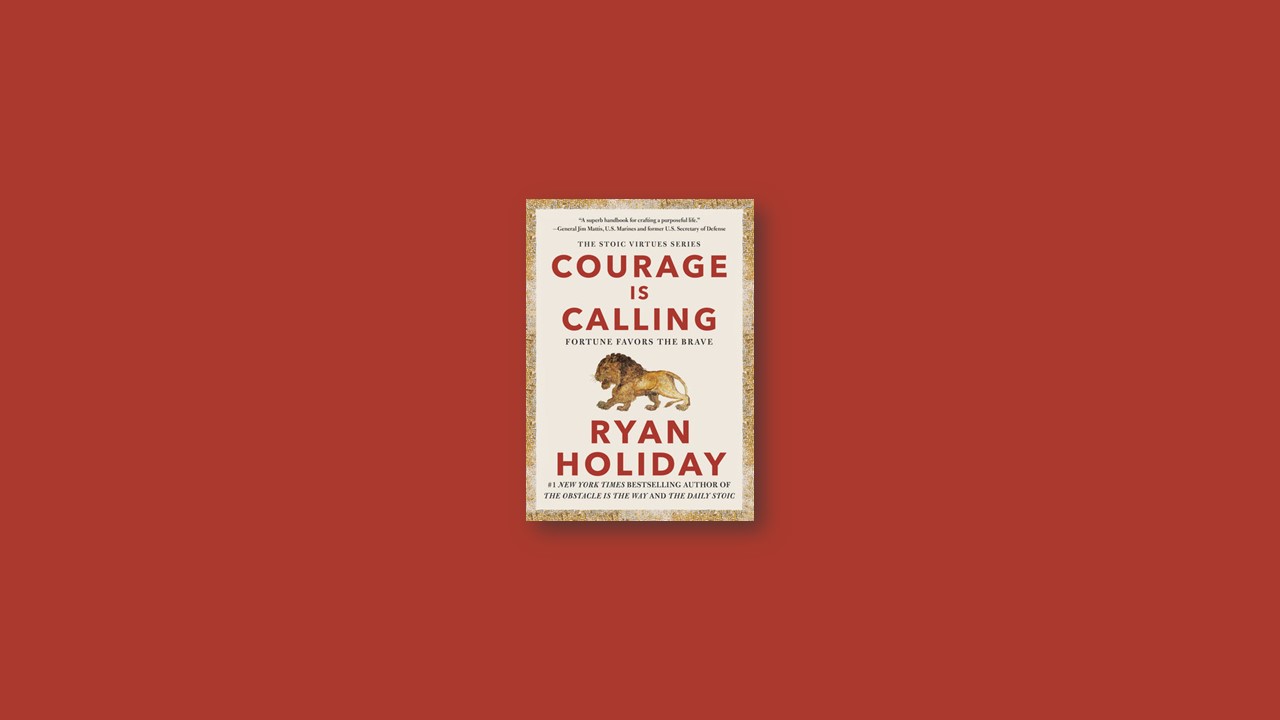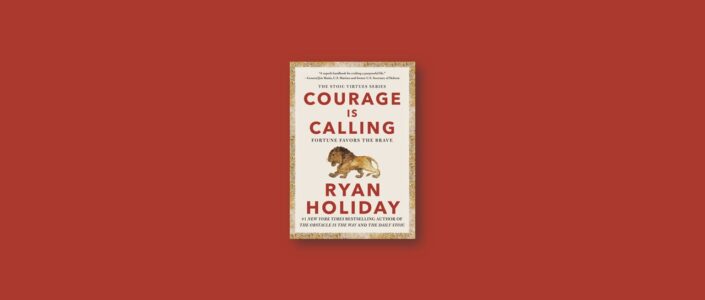The Call We Fear . . .
Today, each of us receives our own call.
To service.
To take a risk.
To challenge the status quo.
To run toward while others run away.
To rise above our station.
To do what people say is impossible.
There will be so many reasons why this will feel like the wrong thing to do. There will be incredible pressure to put these thoughts, these dreams, this need, out of our mind. Depending on where we are and what we seek to do, the resistance we face may be simple incentives . . . or outright violence.
Fear will make itself felt. It always does.
Will we let it prevent us from answering the call? Will we leave the phone ringing?
Or will we inch ourselves closer and closer steeling ourselves, preparing ourselves, until we’re ready to do what we were put here to do?
We Defeat Fear with Logic
It has been said that leaders are dealers in hope, but in a more practical sense, they are also slayers of fear.
“False Evidence Appearing Real.”
The part of your brain that sees the worst, that extrapolates out the craziest scenario and consistently underestimates your ability to handle it? This is not your friend. Nor is it the truth. The voice that roots against you? The tendency to catastrophize and exaggerate? This is not helpful. It’s not giving you an accurate picture of the world. It’s certainly not making you braver!
Tell yourself: It’s just money. It’s just a bad article. It’s just a meeting with people yelling at one another. Is that something you need to be afraid of?
Break it down. Really look at the facts. Investigate.
Only then can we see.
This Is the Enemy
At the root of most fear is what other people will think of us.
You can’t let fear rule. Because there has never been a person who did something that mattered without pissing people off. There has never been a change that was not met with doubts. There has never been a movement that was not mocked. There was never a groundbreaking business that wasn’t loudly predicted to fail.
And there has never, ever been a time when the average opinion of faceless, unaccountable strangers should be valued above our own considered judgment.
Focus on What’s in Front of You
It doesn’t matter who you are, you’ve probably got something to be worried about. And is the worry helping us? No. It distracts and obsesses us. It takes us down rabbit holes of doubt and insecurity, through fantasies of extrapolation and doomsday predictions. All cognitive costs taking us away from the actual task at hand.
There is plenty for you here right now. That’s why the Stoics talked about sticking with “first impressions.” Just what you see. What’s here. Not everything else that may or may not someday be related to it.
This call you have to make. This check you have to write. This tightrope you need to walk, this throng you need to charge into.
It’s enough. Too much, even.
Never Question Another Man’s Courage
People are going to break. You have to understand this. People are going to struggle. As Epictetus, shaped by the empathy cultivated from his thirty years in slavery, would say, until we know someone’s reasons, we don’t even know that they acted wrongly.
We have no idea how terrified the brave were either. “Only the laundry knew how scared I was,” Louis Zamperini said as he reflected on his time as a POW in the Japanese Naoetsu camp. Thankfully, this fear never broke him, not fully anyway, not publicly—but it came close. Judge not, lest ye be judged.
If we are going to indict anyone for their cowardice, let it be silently, by example.
Waste not a second questioning another man’s courage. Put that scrutiny solely on your own.
We Are Afraid to Believe
If we don’t believe in anything, it becomes very hard to find anything worth believing in. We make our nihilism true, just as we do when we buy the lie that we have no agency; or alternatively, that while we don’t control what has happened, we do control how we happen to respond. If you fear that there isn’t anything you can do, chances are you will do nothing.
You will also be nothing. A protected, self-justifying nothing.
The brave don’t despair. They believe. They are not cynical, they care. They think there is stuff worth dying for—that good and evil exist. They know that life has problems but would rather be part of the solution than a bystander.
Don’t Fear Decisions
There is a story about a Spartan king who was marching across Greece. As he entered each new country, he sent envoys to ask whether he should be prepared to treat them as friends or enemies.
Most of the nations decided quickly, and most of them chose friendship. But one king wanted to think about his options, because he was afraid of committing. So he thought and he thought and he thought . . . until it was chosen for him.
“Let him consider it, then,” the frustrated Spartan general said as he fixed his jaw, “while we just march on.”
As the song goes, even if you choose not to decide—even if you put things off—you still have made a choice. You are voting for the status quo. You are voting to let them decide. You are voting to give up your own agency.
You Can’t Put Your Safety First
It is risky to try to make the future in business, the strategist Peter Drucker has written, but it’s riskier still not to even try. Because eventually it will happen—someone will try, and then you’ll be on the wrong side of the outcome, or at the very least behind the curve. And that’s when you’ll lose the initiative.
Life is risky. As the poet Dylan Thomas said, each day is “always touch-and-go.” No amount of corporate ass-covering will ever change that. No amount of hiding will actually protect you from scary things. We are already fugitives from the law of averages, we are already marked for death from birth. When you realize this, you can stop being so precious, so concerned about every danger and every possible thing that can go wrong.
All certainty is uncertain. You’re not safe. You never will be. No one is. In putting safety above everything, we actually put ourselves in danger. Of being forgotten. Of never coming close. Of being complicit.
How will you handle the danger?
“What will happen to me?” No one can tell you that. But with courage, you can say yourself, “I’m not sure, but I will get through it with my soul intact. I will make the best of it. I will not be afraid.”
The Scariest Thing To Be Is Yourself
It’s ironic that a pioneering feminist like Florence Nightingale criticized women who tried to “be like men.” Just be yourself, she was saying—we don’t need anyone apishly imitating anyone else or instinctually rejecting anyone either. We all face other people’s expectations and stereotypes. We resist this, and at the same time, we can remember Seneca’s advice: We don’t need to buck the crowd on every single little thing. We don’t need to be different for the sake of being different—petulant rebellion can be its own kind of defense mechanism.
But if we do, on the outside, look the same as everyone else, we better make damn sure that on the inside everything is different. That we are truly who we want to be, how we know deep down it feels right to be.
Because the courage to be different is the courage to think different, to see what others don’t see, to hear what others don’t hear. It’s not a coincidence that so many whistleblowers and artists were weirdos. It was precisely their weirdness that allowed them to see what everyone else was unable to see.
Be original. Be yourself. To be anything else is to be a coward.
Life Happens in Public. Get Used to It.
You put on the tights. You push through the stage fright—the fright that persists even after you’ve mastered the art of public speaking. You enter the witness stand. You deliver the hard news to the assembled employees. You just learn to stop thinking about what they think. You’ll never do original work if you can’t. You have to be willing not only to step away from the herd but get up in front of them and say what you truly think or feel. It’s called “public life” for a reason. We don’t get to succeed privately.
When we flee in the direction of comfort, of raising no eyebrows, of standing in the back of the room instead of the front, what we are fleeing is opportunity. When we defer to fear, when we let it decide what we will and won’t do, we miss so much. Not just success, but actualization.
You Can’t Be Afraid to Ask
We are afraid to open up. We are scared to share. We don’t want anyone to know how we’re feeling inside . . . and so all of us feel more alone. What strength it takes to beat back this fear. What pain is caused by the inability or the unwillingness to do so.
When the student asks a question, what happens? They learn something they didn’t know. When the friend reveals a vulnerability to another, what happens? The friendship gets stronger. When the employee admits the workload is too much, what happens? A hire is made and the company gets more efficient. When somebody has the courage to speak about something shameful that was done to them? Society is propelled into action. Someone can help them stop it
You won’t get any of this if you don’t ask. You won’t get what you’re afraid to admit you need. So ask now, right now, while you have the courage. Before it’s too late.
When We Rise Above . . .
We have countless expressions. The tall poppy gets cut down. Go with the grain, not against it. You can’t beat City Hall.
And yet? If everyone believed this, if fear ruled supreme, not only would those expressions become effective truths, but good would never triumph over evil, new would never break through the status quo, and nothing would ever be improved.
That can’t be what we want. That can’t be what we were put on this planet to do
Some people, sure. But not you.
We choose what voice we will listen to. We choose whether we’ll play it safe, think small, be afraid, conform, hide, or be cynical. We choose whether we will break these fears down, whether we’ll go our own way, whether we look down over the side of the narrow bridge and turn back—or keep going.
To have courage? To brave fear? That’s our call. We don’t have to do it
But we can’t escape the fact that it is the thing upon which every other good thing depends.
What we want in life, what the world needs—all of it is on the other side of fear. All of it is accessed through courage, should we choose to wield it.


